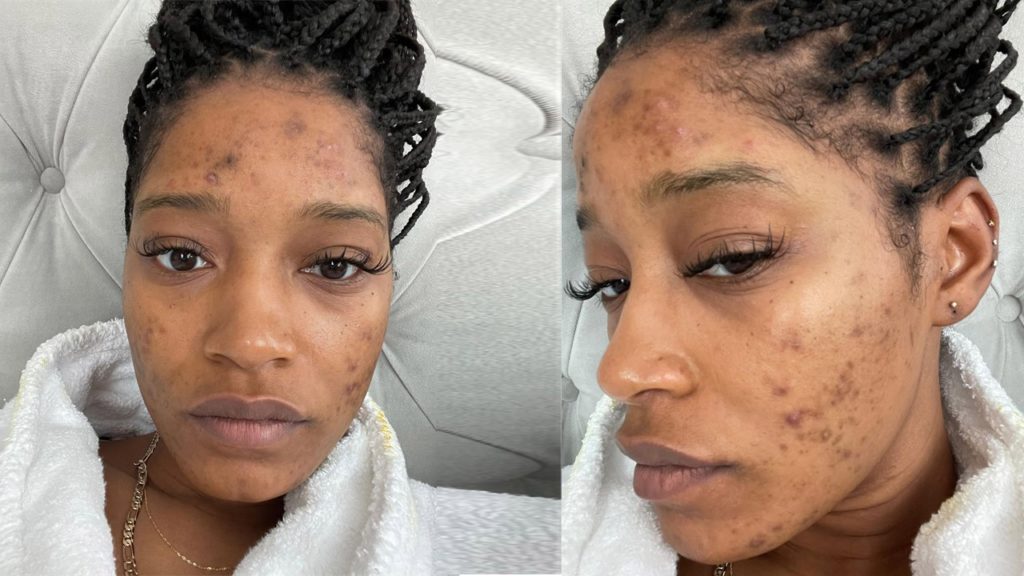
Multi-talented actress/singer Keke Palmer has always been outspoken about her life. So, when the Akeelah & the Bee star found out she had PCOS, she knew she had to share.
Via Instagram, Keke shared:
“Hey you guys, for some of you this may be TMI, but for me my platform has always been used for things much greater than me. Poly Cystic Ovarian Syndrome has been attacking me from the inside out my entire life and I had no idea. My acne has been so bad that people in my field offered to pay for me to get it fixed. I tried EVERYTHING. I did Accutane TWICE. People say drink water, have a better diet, but I did all that, I ate all the “right” things, my blood tests were fine. But it took ME taking a personal look into my family that has a history of diabetes and obesity, to understand what was ACTUALLY happening with me. And unfortunately doctors are people and if you don’t “look the part” they may not think that’s your problem. They may not even suggest it if you “look healthy” whatever that means! I came to a doctor in tears once and all they offered was a measles vaccine... Exactly."
"I’m posting this to say that it’s okay and we can help ourselves. My skin has made me sad many nights but I do not give up on myself. I know this is not me and my body has been looking for help. I do not have a medical degree but I did the research and took what I learned to a doctor and that led them to a proper diagnosis. I’m not saying trust web md for everything haha but what I am saying is no one can help us like we can help ourselves."
"This especially makes me sad because my family struggled for years and no doctor could help them, they actually mislead them and just took their money. It’s only because of what my family sacrificed that allows me to even have the resources to share the information I’m sharing with you! Their fight out of poverty gave me a better life and I just want to share what I learn."

"The least harmful thing PCOS can bring is acne. To all the people struggling with this please know you’re not alone and that you are still so fucking fine! MY ACNE AINT NEVER STOPPED ME. But we don’t have accept this. Now I can really help KEKE! And I love her so it’s ON."
"Pray for me on this journey and I will pray for you too. I’m not afraid to show myself to the world and you shouldn’t be either” she wrote.
What is PCOS?
According to the Center for Disease Control (CDC) polycystic ovary syndrome (PCOS) is a hormonal disorder common among women of reproductive age. Women with PCOS may have infrequent or prolonged menstrual periods or excess male hormone (androgen) levels. The ovaries may develop numerous small collections of fluid (follicles) and fail to regularly release eggs.
PCOS is one of the most common causes of female infertility, affecting 6% to 12% (as many as 5 million) of US women of reproductive age. But it’s a lot more than that. This lifelong health condition continues far beyond the child-bearing years.
The CDC says that women with PCOS are often insulin resistant; their bodies can make insulin but can’t use it effectively, increasing their risk for type 2 diabetes. They also have higher levels of androgens (male hormones that females also have), which can stop eggs from being released (ovulation) and cause irregular periods, acne, thinning scalp hair, and excess hair growth on the face and body.
Although the exact causes aren’t known at this time, androgen levels that are higher than normal play an important part. Excess weight and family history—which are in turn related to insulin resistance—can also contribute.
This speaks to the tough journey that Keke and her family have been on when trying to get a clear diagnosis from doctors.
Former "Glee" actress Lea Michele also shared last year that she experienced similar issues with acne and also weight gain that led to a diagnosis of PCOS.
"There are way more extreme versions of PCOS that women have a lot of difficulty with — mine is not as intense," she said. "Which is why I haven't really talked about it, because there are women who have it so much more intense."
The main treatment is birth control pills, which can fix many of the issues related to PCOS, according to experts. Oral contraceptives can also help regulate irregular periods and clear up acne by reducing testosterone levels.
To find out more about PCOS and treatment options, visit the PCOS Awareness Association at https://www.pcosaa.org/.









